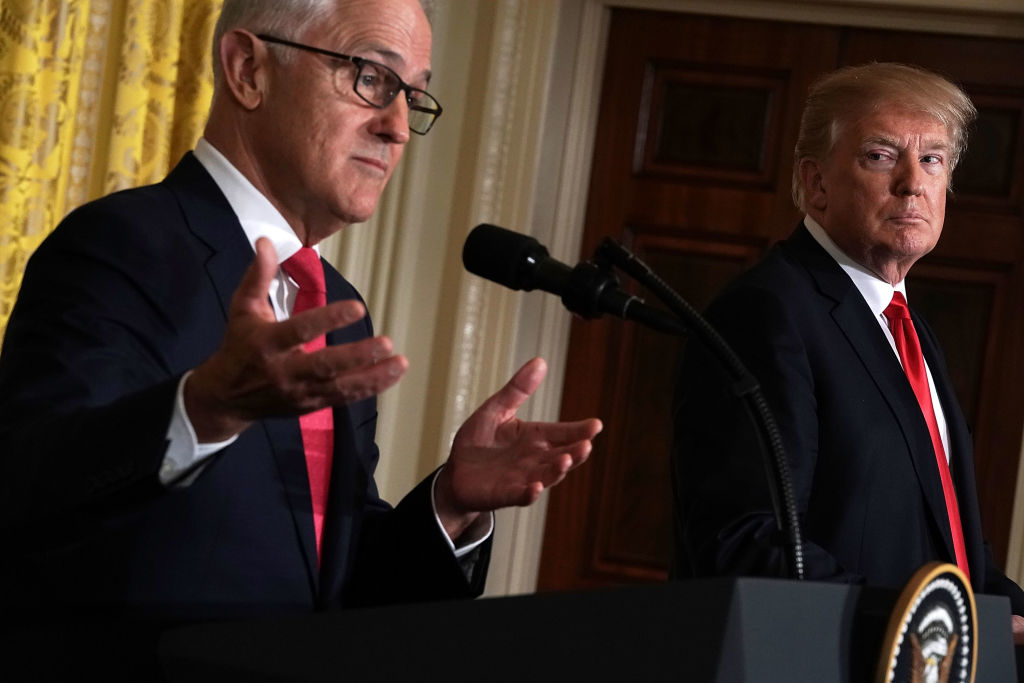
Australia has a split policy ticket on Donald Trump—quietly horrified at his multilateral impact, yet quite satisfied with the bilateral relationship.
Multilateral smash-up contrasts with relative bilateral smoothness.
Canberra clings to the Trump administration while opposing the US president on trade and the ‘rules-based’ international system.
Weighting policy differently in bilateral versus multilateral dealings is standard diplomacy. But the personality of the ‘leader of the free world’ has dramatised the barbed-wire straddle, the tensions between Australia’s alliance and global interests.
Pause to consider the phrase, ‘leader of the free world’. Not long ago it was a statement of fact. Now the quote marks are ironic, denoting the title of a strange reality-TV show. That’s a tragedy for us as much as the US.
With Trump, the personal
is policy. And what dreadful policy that personality has delivered on the world stage.
Emphasise that, on a strictly bilateral view, Trump has turned out fine for Australia. It’s only when you widen the lens that much multilateral smoke and ruin comes into focus.
Canberra has performed the bilateral–multilateral straddle with quiet skill—and a sharp eye for the personality of a New York billionaire. Fortunately, the Australian prime minister on watch when Trump arrived had experience with billionaires. As Malcolm Turnbull observes:
For all of Trump’s so-called madness, in my own dealings with him I found him no less rational than many other billionaires I have dealt with over the years. For all of our differences, as two businessmen, we spoke the same language.
The Trump chapter in
Turnbull’s memoir launches with
this quote: ‘Don’t worry Malcolm. The American people will never elect a lunatic to sit in this office.’
The speaker is Barack Obama, talking to the Oz PM in the Oval Office at the start of the 2016 election year. By November, Turnbull writes, the world was stunned because ‘the unthinkable had happened. And lunatic or not, Trump had won.’
The psychological analysis the Canberra system offered was that Trump was ‘a narcissist who’d respond well to flattery’. Turnbull says he dismissed this approach as mistaken. Based on the billionaires he’s known (Kerry Packer, Conrad Black, Jimmy Goldsmith, Bob Maxwell), ‘sucking up to them is precisely the wrong way to go’.
Turnbull applies the same word to Trump as he
does to China: ‘bully’. Like any predator, Trump ‘could sense fear and weakness from miles away’. Deference and flattery didn’t earn respect or gratitude. Japan’s Abe Shinzo tried flattery, he writes, and in return ‘Trump was pretty tough on Abe’.
Instead, Turnbull says he was ‘frank and forthright’ in their two big bilateral arm wrestles. The forthright stuff was all in private. In public, Australia has followed the quiet policy: if Canberra can’t say something nice about Trump, it switches to generalities about how wonderful the US is.
The first fight was getting Trump to honour the agreement for the US to accept refugees Australia had sent to Nauru and Manus Island. The refugees caused a
notorious Trump–Turnbull
phone conversation on 28 January 2017, a week after the president’s inauguration. Trump berated Turnbull (‘This is the worst deal ever.’)
The deal held, and soon Trump was joking about the Oz PM’s negotiating skills. ‘The subject of an incandescent row a few months before was now something to make light of. It was just another deal’, Turnbull recalls.
The second protracted fight was to exempt Australian steel and aluminium from US tariffs and quotas. About 15 of the 23 pages of the Trump chapter track through this ‘contentious issue’. Turnbull says Trump was ‘thoughtful and good-humoured’ and ultimately exempted Australia.
Canberra tailored its arguments and pleas to reach a US president who is more of a talker than a reader and has a zero-sum view of trade: I win, you lose.
Thus, when writing to Trump about the tariff/quota tussle, Turnbull’s letter had to be ‘short and punchy and written not just to be read, but to be read aloud—more like a script’.
In dealing with Trump, Turnbull says he worked to protect Australia’s particular interests and, ‘as far as I could, influence him to act in a way that advanced our wider interests’. Dwelling on the bilateral, Turnbull’s references to Trump’s multilateral impacts tend to be sharp asides rather than a sustained discussion.
On a continued US role in ‘our region’, Turnbull has a hopeful formulation, saying that, despite ‘some dramatic flourishes’, Trump ‘has not let us down’. Then Turnbull reaches beyond Trump to a broader hope about the US: ‘The “indispensible nation” is nowhere more so than in our region.’
The discussion of Trump’s views, though, is at odds with the notion of the US continuing to play that indispensible role. And the separate chapter on saving the Trans-Pacific Partnership after Trump jumped ship comments that the remaining TPP nations felt ‘a little liberated that we could do it ourselves: the United States wasn’t as essential as everyone had thought’.
Turnbull calls Trump a ‘natural isolationist’ with a ‘thoroughly dystopian’ perspective on East Asia and the Middle East. He writes that Trump’s ‘wilful and intemperate nature’ and ‘deliberate unpredictability’ generate fear rather than respect for the US:
America may be stronger in economic and military terms, but its influence is diminished. In fact, under Trump, America seeks less influence, not least by rejecting many of the global institutions created by the USA after the Second World War. Most consequential of all, I fear, will be his withdrawal from the Paris Agreement. The world will struggle to meet the challenge of global warming without American leadership. And wherever Trump creates a leadership vacuum, others will fill it, often with values very different to our own.
 Print This Post
Print This Post